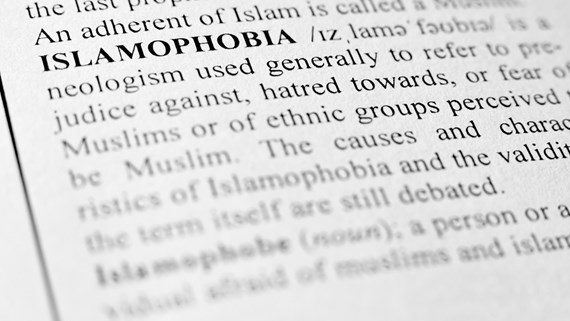Islamophobia in the workplace
Blog

In this two-part series of articles, we are looking at prevalent forms of religious and / or race discrimination in the workplace. In this article, we are focusing on islamophobia. In the first article in our series, we considered antisemitism – you can access our article here.
Islamophobia is very common in the UK. In a survey carried out by the Equality and Human Rights Commission in 2018, 70 per cent of people of the Muslim faith said they had experienced religion-based prejudice in the preceding year. For the year ending March 2020, Home Office data shows that half of all recorded religious hate crime offences were targeted against people of the Muslim faith. In May 2021, the Singh investigation report, which was commissioned by the UK Conservative Party, stated that Islamophobia “remains a problem” within the party and found that two-thirds of all incidents reported to the Party’s headquarters between 2015 and 2020 related to allegations of anti-Muslim discrimination.
In the employment context, research from 2017 found that young people of the Muslim faith are being “held back from reaching their full potential at every stage of their lives”. It found that young Muslims feel their participation in the labour market is hampered by discrimination in the recruitment process, with some interviewees reporting that minority ethnic-sounding names reduce the likelihood of people being offered an interview. Once in work, respondents reported that racism, discrimination and lack of cultural awareness in the workplace had impacted on their career development and progression. Women of the Muslim faith who participated in the research reported that wearing the headscarf at work “was an additional visual marker of difference that was perceived and experienced as leading to further discrimination”.
In this article we consider the definition of Islamophobia, how Islamophobia is treated under civil and criminal law, and practical tips for employers on guarding against Islamophobia in the workplace (and addressing incidents or allegations).
Definition
Islamophobia is broadly understood to mean the fear of, hatred of, or prejudice against the religion of Islam or people of the Muslim faith in general. As it stands, there is no legally binding definition of Islamophobia.
While not universally accepted, the All Party Parliamentary Group (APPG) on British Muslims’ working definition of Islamophobia is:
“Islamophobia is rooted in racism and is a type of racism that targets expressions of Muslimness or perceived Muslimness.”
The APPG gave contemporary examples of Islamophobia, including:
- “Calling for, aiding, instigating or justifying the killing or harming of Muslims in the name of a racist / fascist ideology, or an extremist view of religion”.
- Making “dehumanizing, demonizing, or stereotypical allegations about Muslims as such, or of Muslims as a collective group” including “the myth of Muslim identity having a unique propensity for terrorism, and claims of a demographic ‘threat’ posed by Muslims or of a ‘Muslim takeover’”.
- “Accusing Muslims as a group of being responsible for real or imagined wrongdoing committed by a single Muslim person or group of Muslim individuals, or even for acts committed by non-Muslims”.
The UK Government rejected the APPG definition in 2019 on that basis that it raised “practical and legal challenges” and was “not in line with the definition [of racism] enshrined in the Equality Act 2010”. It announced that it would appoint two expert advisers to establish a new working definition of Islamophobia.
In the meantime, the APPG definition has been adopted by city councils, various political parties include Labour, the Liberal Democrats, Plaid Cymru and the Scottish National Party, and has been endorsed by 750 British Muslim organisations, 80 academics and 50 MPs. The Muslim Council of Britain (MCB), the UK’s largest umbrella body for people of the Muslim faith, has endorsed the APPG definition. In a report published in March this year, the MCB states:
“at the core of the definition is recognising Islamophobia as a type of racism that results in the prejudicial targeting of markers of Muslim identity. On the one hand, for some, it may appear counter-intuitive to view Islamophobia as a type of racism given Islam is a faith, not a race, and that Muslims come from a number of different ethnic community backgrounds. For such individuals, they may think that by calling Islamophobia, it removes the targeting of Muslims’ religious practices from the scope of Islamophobia. However, as is well established in academia and amongst those familiar with the topic, Islamophobia functions much like racism towards people of minority ethnic backgrounds does, and very much would include the racist targeting of a Muslim woman wearing a headscarf, for example”.
How is Islamophobia treated under discrimination law?
Although there is no legally binding definition of Islamophobia, the protected characteristics of “race” and “religion or belief” under the Equality Act 2010 are relevant in this context. By way of a reminder, the Equality Act protects people from discrimination on the grounds of nine protected characteristics, including the two mentioned.
As we highlighted in our article on antisemitism, “religion” under the Equality Act means any religion and a reference to religion includes a reference to a lack of religion. “Belief” means any religious or philosophical belief and a reference to belief includes a reference to a lack of belief. “Race” includes colour, nationality and ethnic or national origins.
It has been held that Islam is a religion for the purposes of discrimination legislation. Although some religions have been recognised by the courts and tribunals as also being a race (including Judaism, as we explained in last week’s article), the position on whether Muslims are a “race” is less straightforward. Mandla and anor v Dowell-Lee, the leading case on the definition of an ethnic group, established the following principles for identifying an ethnic group (the first two of which are essential):
- possession and consciousness of a long shared history,
- a cultural tradition of its own, including family and social customs and manners,
- either a common geographical origin or descent from a small number of common ancestors,
- a common language, but not one necessarily peculiar to the group,
- a common literature peculiar to the group,
- a common religion different from that of neighbouring groups or from the general community surrounding it, and
- being a minority or oppressed or a dominant group within a larger community.
Applying the above test, it has been held that people of the Muslim faith in general do not constitute an ethnic group for the purpose of a direct race discrimination claim. For further discussion of this issue, please see our previous blog. However, Muslim claimants have been successful in obtaining race discrimination protection in some indirect discrimination cases. For example, it was held in JH Walker Ltd v Hussain that a workplace policy that prevented workers from taking holiday to celebrate Eid was indirectly discriminatory against workers originating from the Indian subcontinent.
Relevant criminal law
In serious cases, Islamophobic behaviour in the workplace might breach criminal law. Although there is no specific offence of Islamophobia, there is legislation in place in the UK to protect people from racial or religious hatred.
The Racial and Religious Hatred Act 2006 makes it an offence for someone to intentionally stir up hatred against an individual on the grounds of religious or racial background by using threatening words or behaviour or displaying threatening written material. Racial hatred is defined as hatred against a group of persons defined by reference to colour, race, nationality or ethnic or national origins.
As we discussed previously in relation to antisemitism, depending on the facts of the case, Islamophobic behaviour could involve other criminal offences.
Tips for employers
In our article on antisemitism, we set out various practical tips for employers on guarding against and managing allegations of antisemitism in the workplace. We have adapted these below in the context of Islamophobia:
Equal opportunities / bullying and harassment training
Employers can be held vicariously liable for discrimination or harassment committed by an employee, unless they can show that they took all reasonable steps to prevent an employee from carrying out the discriminatory act. Employers should therefore be providing an ongoing programme of equal opportunities (including unconscious bias) training, to avoid it going stale in employees’ minds. See our previous blog: Don’t let your equality and diversity training go “stale”. Training should equip staff to recognise and safely challenge unacceptable behaviour.
Religious holidays
The Equality and Human Rights Commission Code of Practice states that employers should seek to accommodate an employee’s request for annual leave for a religious occasion, provided that they have sufficient holiday entitlement and it is reasonable for them to be absent from work during the period requested. Acas has also published guidance on key workplace considerations during Ramadan.
Dress code
Employers must be aware that dress codes cannot interfere with an employee’s right to manifest their belief, unless it can be objectively justified.
Increasing inclusivity
Increasing inclusivity for employees of the Muslim faith might include providing a prayer room (as Muslims are required to offer five daily prayers), and offering Halal food and non-alcoholic drinks options at work events.
Policies
Ensure your policies on equal opportunities, bullying and harassment and whistleblowing are up to date. It’s also worth checking for consistency between different policies, eg to ensure that the code of conduct doesn’t undermine the bullying and harassment policy.
Online conduct / conduct outside of work
In certain circumstances, it may be possible to discipline online conduct or conduct outside of work, for example where there is a clear link between the conduct / employee and the employer, where the conduct impacts on other employees or where the employer’s reputation is harmed as a result of the conduct. It is therefore worth checking that your policies and codes of conduct allow for disciplinary sanctions relating to online conduct and conduct outside of work. Introducing a clear policy on social media use can also ensure that employers can restrain unacceptable behaviour online.
Managing allegations
Employers can support Muslim employees by recognising that Islamophobia can take many forms, including verbal slurs, stereotyping and conspiracy theories. Employers should ensure that the channels in place for reporting incidents are effective. When allegations are raised, no matter how “low level” they seem eg jokes / banter, they must be addressed promptly, proportionately and fairly. Fair processes are key, as is avoiding knee jerk reactions, which can cause issues if litigation arises further down the line.
With special thanks to Annisa Khan, a paralegal at Farrer & Co, for her assistance with this article.
If you require further information about anything covered in this blog, please contact Maria Strauss, Tabitha Juster, Xinlan Rose, or your usual contact at the firm on +44 (0)20 3375 7000.
This publication is a general summary of the law. It should not replace legal advice tailored to your specific circumstances.
© Farrer & Co LLP, July 2021







